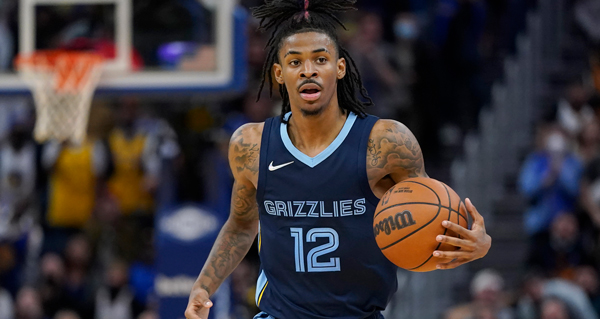This past Saturday morning, at the crack of dawn, Memphis Grizzlies All-Star Ja Morant went live on his Instagram account. In the video—since deleted, but recorded for posterity by the many sleepless reputational score-keepers of the internet—Morant flashes a gun while bouncing around at a nightclub (which, again, if we’re keeping the time of day in mind, should really be understood as a morning club). Morant is 23, so his body can probably recover from existential marathon partying quickly enough to play basketball well the next day, but it’s certainly not a formula for sustained success, and that’s before you consider the gun.
A gun is an instrument of harm, a type of murder tool that’s more available and more murderous in America right now than it’s ever been anywhere, ever. It does not take a special kind of person to acquire or brandish one. Even children can get them. This is not a great state of affairs, broadly speaking. That Morant finds it important, on some level, to prove his literacy with this tool is odd, given how common and crude such knowledge is, and how rare the thing that makes him famous is. There are at least tens of millions of frightening gun owners in this country, but you cannot use all ten fingers to compile a list of more gifted at-the-basket athletes in the history of the NBA than Morant.
This isn’t the first time Morant has been accused of bragging about the wrong things, with the Instagram session acting as an escalatory image after weeks of gnarly stories about the young star. Police reports and journalists tell us that he’s been violent away from the limelight—threatening wage workers who peeve his mother at the mall, and brutalizing teenagers who step to him during pick-up games, among other actions. He and his hyper-bothersome teammate, Dillon Brooks, got into a memorably ugly chest-puffing contest with Shannon Sharpe as he was sitting courtside at a Lakers game. There was a whole other in-game brouhaha with the Indiana Pacers, involving Morant’s ever-present dad and one of his best friends, who also comes to lots of games.
The matter of whether Morant’s behavior is authentic seems of great concern to many fans and media members, but it is immaterial. Violence is violence; it doesn’t matter if the person committing it is “really like that,” and even if it did, Twitter users ought to find better evidence for disproving that he is than a single photo of him wearing a polo shirt and boat shoes, when he was younger. How expensive do those trying to deny Morant’s street credentials believe these items to be? They are sold at T.J. Maxx, among many other discount big-box establishments, and can be had for less cost than a mid-tier cheeseburger. There is a whole other, more upsetting dimension of rejection seen online, suggesting Morant’s troubling energy is more performed than real because his parents are still together. This is a form of sociological charlatanism too offensive for a counter-argument.
It’s unfortunate that any of this stuff needs to be said, especially if you’re old enough to have been around for the last time the NBA’s stars were in this crosshairs. In the early-to-mid 2000’s, the sport was struggling to build an ecosystem of infectious celebrity after Michael Jordan’s retirement, and very much waiting for the Godot that would be LeBron James. During this liminal phase, Allen Iverson and basically all of the Portland Trail Blazers became subjects of daily, nauseating moral analysis that ultimately led to a repressive and racist dress code. All kinds of fallacies, about some of the most important elements of society, dominated sports media during these years. Portland’s team became known as the “Jail Blazers” while rostering few actual criminals; two marginal players were legitimately bad fellows, but the rest of them were just loud mouths and marijuana smokers.
This was not fun to live through, and reminders of that time are unwelcome. Morant’s misdeeds are serious, though—more serious, in fact, than most of those that created value-debate “news” cycles two decades ago. It’s certainly appreciated that these things are understood in a more sober fashion than they used to be; thus far, most media sees Morant’s actions as his own, and are not used as the launching point for a wider referendum on the character of his profession. Morant and the Grizzlies have announced he will be away from the team for at least two games, following his post, and he has deleted his social media accounts as well. If we are lucky, this will be the end of a tear in the 2023 NBA fabric, which is then sewed up instead of widened. We do not want those turn-of-the-century ghosts coming back here.



